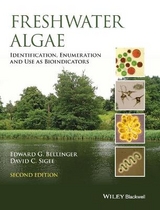
Freshwater Algae
Wiley-Blackwell (Verlag)
978-0-470-05814-5 (ISBN)
- Titel ist leider vergriffen;
keine Neuauflage - Artikel merken
Freshwater Algae: Identification and Use as Bioindicatorsprovides a comprehensive guide to temperate freshwater algae, withadditional information on key species in relation to environmentalcharacteristics and implications for aquatic management. Thebook uniquely combines practical material on techniques and waterquality management with basic algal taxonomy and the role of algaeas bioindicators. Freshwater Algae: Identification and Use as Bioindicatorsis divided into two parts. Part I describes techniques for thesampling, measuring and observation of algae and then looks at therole of algae as bioindicators and the implications for aquaticmanagement. Part II provides the identification of major genera and250 important species. Well illustrated with numerous original illustrations andphotographs, this reference work is essential reading for allpractitioners and researchers concerned with assessing and managingthe aquatic environment.
Professor Edward G. Bellinger and Dr David C. Sigee, both of Faculty of Life Sciences, 3.614 Stopford Building, The University of Manchester, UK.
Preface. Copyright Acknowledgements. 1 Introduction to Freshwater Algae. 1.1 General introduction. 1.1.1 Algae - An overview. 1.1.2 Algae as primary producers. 1.1.3 Freshwater environments. 1.1.4 Planktonic and benthic algae. 1.1.5 Size and shape. 1.2 Taxonomic variation - the major groups of algae. 1.2.1 Microscopical appearance. 1.2.2 Biochemistry and cell structure. 1.2.3 Molecular characteristics and identification. 1.3 Blue-green algae. 1.3.1 Cytology. 1.3.2 Morphological and taxonomic diversity. 1.3.3 Ecology. 1.3.4 Blue-green algae as bio-indicators. 1.4 Green algae. 1.4.1 Cytology. 1.4.2 Morphological diversity. 1.4.3 Ecology. 1.4.4 Green algae as bioindicators. 1.5 Euglenoids. 1.5.1 Cytology. 1.5.2 Morphological diversity. 1.5.3 Ecology. 1.5.4 Euglenoids as bioindicators. 1.6 Yellow-green algae. 1.6.1 Cytology. 1.6.2 Morphological diversity. 1.6.3 Ecology. 1.6.4 Yellow-green algae as bioindicators. 1.7 Dinoflagellates. 1.7.1 Cytology. 1.7.2 Morphological diversity. 1.7.3 Ecology. 1.8 Cryptomonads. 1.8.1 Cytology. 1.8.2 Comparison with euglenoid algae. 1.8.3 Biodiversity. 1.8.4 Ecology. 1.8.5 Cryptomonads as bioindicators. 1.9 Chrysophytes. 1.9.1 Cytology. 1.9.2 Morphological diversity. 1.9.3 Ecology. 1.9.4 Chrysophytes as bioindicators. 1.10 Diatoms. 1.10.1 Cytology. 1.10.2 Morphological diversity. 1.10.3 Ecology. 1.10.4 Diatoms as bioindicators. 1.11 Red algae. 1.12 Brown algae. 2 Sampling, Biomass Estimation and Counts of FreshwaterAlgae. A Planktonic Algae. 2.1 Protocol for collection. 2.1.1 Standing water phytoplankton. 2.1.1 River phytoplankton. 2.2 Mode of collection. 2.2.1 Phytoplankton trawl net. 2.2.2 Volume samplers. 2.2.3 Integrated sampling. 2.2.4. Sediment traps. 2.3 Phytoplankton biomass. 2.3.1 Turbidity. 2.3.2 Dry weight and ash-free dry weight. 2.3.3 Pigment concentrations. 2.4 Flow cytometry: automated analysis of phytoplanktonpopulations. 2.5 Microscope counts of species populations. 2.5.1 Sample preservation and processing. 2.5.2 Species counts. 2.5.3 Conversion of species counts to biovolumes. 2.5.4 Chemical cleaning of diatoms. 2.6 Diversity within single-species populations. 2.6.1 Molecular analysis. 2.6.2 Analytical microscopical techniques. B Non-Planktonic Algae. 2.7 Deep water benthic algae. 2.7.1 Benthic-pelagic coupling. 2.7.2 Benthic algae and sediment stability. 2.7.3 Invertebrate grazing of benthic algae. 2.8 Shallow water communities. 2.8.1 Substrate. 2.8.2 Algal communities. 2.9 Algal biofilms. 2.9.1 Mucilaginous biofilms. 2.9.2 Biomass. 2.9.3 Taxonomic composition. 2.9.4 Matrix structure. 2.10 Periphyton - algal mats. 2.10.1 Inorganic substratum. 2.10.2 Plant surfaces. 3 Algae as bioindicators. 3.1 Bioindicators and water quality. 3.1.1 Biomarkers and bioindicators. 3.1.2 Characteristics of bioindicators. 3.1.3 Biological monitoring versus chemical measurements. 3.1.4 Monitoring water quality: objectives. 3.2 Lakes. 3.2.1 Contemporary planktonic and attached algae asbioindicators. 3.2.2 Fossil algae as bioindicators: lake sediment analysis. 3.2.3 Water quality parameters: inorganic and organic nutrients,acidity and heavy metals. 3.3 Wetlands. 3.4 Rivers. 3.4.1 The periphyton community. 3.4.2 River diatoms. 3.4.3 Evaluation of the diatom community. 3.4.4 Human impacts and diatom indices. 3.4.5 Calculation of diatom indices. 3.4.6 Practical applications of diatom indices. 3.5 Estuaries. 3.5.1 Ecosystem complexity. 3.5.2 Algae as estuarine bioindicators. 4 A Key to the More Frequently Occurring FreshwaterAlgae. 4.1 Introduction to the key. 4.1.1 Using the key. 4.1.2 Morphological groupings. 4.2 Key to the main genera and species. 4.3 List of algae included and their occurrence in the key. 4.4 Algal identification: bibliography. Glossary. References. Index.
| Erscheint lt. Verlag | 15.6.2010 |
|---|---|
| Zusatzinfo | ill |
| Verlagsort | Hoboken |
| Sprache | englisch |
| Maße | 194 x 252 mm |
| Gewicht | 804 g |
| Einbandart | gebunden |
| Themenwelt | Naturwissenschaften ► Biologie ► Botanik |
| Naturwissenschaften ► Biologie ► Limnologie / Meeresbiologie | |
| Naturwissenschaften ► Biologie ► Mikrobiologie / Immunologie | |
| ISBN-10 | 0-470-05814-5 / 0470058145 |
| ISBN-13 | 978-0-470-05814-5 / 9780470058145 |
| Zustand | Neuware |
| Informationen gemäß Produktsicherheitsverordnung (GPSR) | |
| Haben Sie eine Frage zum Produkt? |
aus dem Bereich



